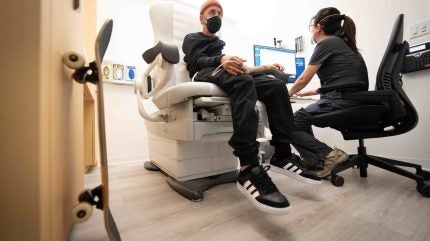
A new type of self-adjusting neuromodulation is poised to transform the landscape of neurology, as per analyst reaction to results from two studies evaluating the technology.
The pair of studies, conducted at University of California, San Francisco (UCSF), tested what it calls ‘intelligent brain pacemakers’ – an implant that uses an approach called adaptive brain stimulation (aDBS). This method involves using artificial intelligence (AI) to spot changes in patient symptoms via brain activity monitoring and then delivering personalised care.

Discover B2B Marketing That Performs
Combine business intelligence and editorial excellence to reach engaged professionals across 36 leading media platforms.
“As the landscape of medical treatment evolves, particularly with these sophisticated systems, a promising shift is being witnessed towards more personalised and effective treatment strategies for neurological conditions,” Says GlobalData medical device analyst Cynthia Stinchcombe.
Results from the studies, published in Nature Communications and Nature Medicine in February and August respectively, demonstrated the promise of the platform in patients with Parkinson’s disease, helping patients carry out activities such as sleeping at night and movement problems during day.
The closed-loop technology intervenes with precisely calibrated pulses of electricity when it spots deviations of brain activity and works alongside Parkinson’s medication. This is different to regular DBS, which delivers constant pulses.
“The increasing integration of advanced technology in the management of neurological disorders fits into the broader industry shift towards precision medicine, as reflected in the FDA’s recent push for innovative solutions in Parkinson’s disease management,” explains Stinchcombe.

US Tariffs are shifting - will you react or anticipate?
Don’t let policy changes catch you off guard. Stay proactive with real-time data and expert analysis.
By GlobalDataThe studies “mark a major advancement in the management of Parkinson’s disease” according to GlobalData analysis, which also reflects the growing influence of digital technologies in neurological disease treatment.
The global market for neurological devices was valued at $12.5bn in 2023 and is forecast to reach $20.9 billion by 2033, as per a GlobalData report.
DBS has been a US Food and Drug Administration (FDA)-approved option for Parkinson’s disease patients since 1997. Whilst effective, this type of intervention does not adapt to natural fluctuations in brain activity and cannot account for changes in levels of medications patients take for the disease.
“The big shift we’ve made with adaptive DBS is that we’re able to detect, in real time, where a patient is on the symptom spectrum and match it with the exact amount of stimulation they need,” said Little, associate professor of neurology and a senior author of both studies.
Little’s colleague and senior author of the studies, Dr Philip Starr, calls it the “future of deep brain stimulation for Parkinson’s disease.”
Parkinson’s disease diagnoses are increasing amid ageing populations around the world. A 2022 study by the Parkinson’s Foundation revealed that nearly 90,000 people are diagnosed with Parkinson’s disease in the US each year. According to the Parkinson’s Foundation Parkinson’s Prevalence Project, 1.2 million people in the US will be living with Parkinson’s by 2030.
Stinchcombe says that in the face of ageing populations, the advancements being witnessed are “encouraging for those affected”.
“Emerging technologies are pivotal in broadening the horizons of neurology diagnostics and improving patient outcomes. Together with the FDA’s initiative to enhance AI-driven diagnostics, these advancements are poised to dramatically improve the landscape of neurology,” she adds.





